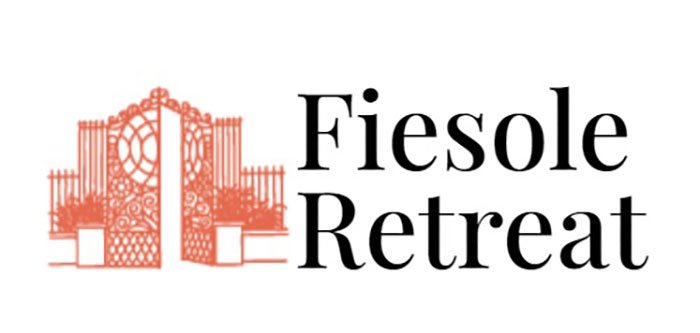Editor’s Note: Today’s post is by Eleonora Colangelo. Eleonora is is a Public Affairs Officer at Frontiers, where she provides strategic guidance on science, technology, and innovation (STI) policies, supporting the alignment of publishing operations with international regulatory frameworks.
Founded in 1999 by Mario Casalini, Rebecca Lenzini, and Katina Strauch “on the basis of a shared idea and the desire to promote dialogue and collaboration in the field of scholarly communication,” The Fiesole Collection Development Retreat came home to Fiesole in the hills above Florence after recent editions in Athens (2022), Basel (2023), and Cape Town (2024).
The 2025 Fiesole Retreat invited participants to pause, reflect, and question the evolving boundaries of academic information. I had the privilege of attending, and what unfolded was more than a periodical meeting of like-minded professionals, but a reconfiguration of relationships across disciplines, generations, and traditionally siloed sectors.
The red thread running through this year’s Retreat was Learning from the Past, Informing the Future — a mission fittingly embodied by this year’s co-hosts. The European University Institute (EUI), a bridge between academia and policy, and CLIR (the Council on Library and Information Resources), a long-time steward of knowledge infrastructures, provided both symbolic and practical grounding for the discussions. All of this unfolded in the spectacular settings of the Badia Fiesolana, Villa Torrossa, and Villa Salviati — venues that seemed to encourage a warm, connecting and immersive dialogue.
What follows is a personal account of the Retreat — of what was said, what remained between the lines, and what this moment in Fiesole might suggest about our collective future, the “next 25 years” (to borrow Casalini family’s words) as a lens for timely conversations.

Day One: AI Literacy, Libraries, and Ethical Innovation
The Retreat opened with librarians at the forefront, a fitting way to begin. In an age defined by algorithmic opacity and generative tools, libraries evolved from gatekeepers to guides, curators, and ferrymen helping navigate the new currents of knowledge creation.
Lisa Bridges (Oregon State University) shared how AI education is being embedded into university curricula. The challenge, she noted, is as much ethical as technical: what do students believe AI is, and what biases are reflected (or magnified) in how it’s taught in universities? Her emphasis on listening over lecturing reflected a broader shift from knowledge transmission to co-creation.
Paris O’Donnell, from Harvard’s I Tatti Center in Florence, introduced a set of AI tools already in use for identifying missing volumes, optimizing acquisitions, and enhancing the serendipity of discovery — not speculative prototypes, but systems reshaping how libraries function behind the scenes.
Carme Fenoll (Universitat Politècnica de Catalunya), in collaboration with Antoni Hernández-Fernández and Instituto Cervantes, brought the spirit of Fiesole to life through a creative lab on AI and the arts. Her work reframed the library as a cultural incubator. Meanwhile, the humanities, far from resisting innovation, are actively shaping its trajectory across continents (on a personal note, Morocco and Egypt’s involvement sparked critical questions for me, adding depth to the project: how does AI evolve in regions where ethical and religious considerations take precedence over technical ones?).
Publishers were equally represented. Piero Attanasio (Italian Publishers Association) traced AI’s journey in publishing, from the monetization of metadata to the insatiable demand for training data. His call for a “trust chain” between libraries and publishers felt particularly timely. As creators and custodians of scholarly ecosystems, both must now act as central nodes in an increasingly complex supply chain.
Richard Gallagher (Annual Reviews) delivered what felt less like a keynote and more like a manifesto: publishing should no longer be seen as the endpoint of academic work, but as a node in a broader, dynamic knowledge cycle. His vision — anticipated by Michael Keller (Stanford University) and echoed by Sy Holsinger (OPERAS) and Giorgos Papadopoulos(Atypon) — asked: who truly benefits from Open Access, and under what terms? Their answer: we must realign infrastructure with user expectations and public values — and ensure the benefits of openness are truly equitable.
Day Two: Humanities in Transition, Value, Metrics, and Future Impact
If Day One focused on tools and ethics, Day Two shifted toward the humanities and their meta-academic value — fittingly so at the European University Institute, where interdisciplinary humanistic research thrives.
Joy Connolly (American Council of Learned Societies, ACLS) opened with a sobering reminder: despite growing public interest in historical justice, climate ethics, and AI, the academic job market for the humanities in the U.S. has contracted by 25% over the past 15 years — a trend that, I cannot help but think, echoes the concerns raised in Martha Nussbaum’s Not for Profit: Why Democracy Needs the Humanities. Her response? A quiet revolution — scholars building alternative, community-embedded, socially impactful careers. Yet, academia’s systems of recognition have yet to catch up as peer-reviewed articles and monographs still dominate, sidelining interdisciplinary and civic scholarship.
Karla Pollmann (University of Tübingen) pushed the philosophical envelope further: openness, she argued, is not a binary but contextual. She invoked the FAIR and CARE principles as ethical compasses and warned of the infrastructural fragilities now shaping our digital age: underfunded platforms, disjointed standards, and unprepared disciplines.
Her questions — “How open, and for whom?” — set the stage for Laetitia Bracco’s presentation of the Open Science Monitoring Initiative (OSMI), supported by UNESCO and the G7 to track the actual realization of Open Science. Something that, as Bracco made clear, cannot be done without publishers, who must either help build the system or risk being governed by it. Later in the day, Alison Mudditt (PLOS) echoed this call presenting the so-called “knowledge stack” — a modular, transparent, and equitable publishing architecture built for the digital age.
The discussions took a more pragmatic turn with Charles Henry’s “All the Money in the World” and “the Perverse Arithmetic of Prestige” (with presentations by Tasha Mellins-Cohen, COUNTER, and Christine Dunn, Clarivate), setting the stage for the central question that followed: Why do we reward quantity over value? When asked this question, Stephen Rhind-Tutt (Coherent Digital) gave a straightforward answer: inertia, with distorted funding, eroded public trust, and the divide between academic metrics and societal impact being major costs. Michael Levine-Clark (University of Denver Libraries) shared a telling example from his institution: internal impact measures rose while rankings dropped, reinforcing that rankings can obscure true value.
Day Three: Inclusion, Partnerships, and Infrastructure Rethought
The final day began with a call to reframe inclusion within the global knowledge system.
Buhle Mbambo-Thata (National University of Lesotho) critiqued dominant metrics that exclude the Global South, neglect linguistic diversity, and undervalue local relevance. Her main appeal is to recognize community engagement as a legitimate metric of research success, which coherently introduced Sharon Memis’ intervention on a new model of international cultural relations — one built on mutual respect and “constructive discomfort.” She presented a practical toolkit, developed with the Association of Commonwealth Universities, to operationalize these values.
Mpho Ngoepe (University of South Africa) illustrated this ethos in action, with UNISA’s library system supporting citizen science by collecting children’s stories in indigenous languages — a moving example of scholarship in service to community.
On the infrastructure side, Heli Kautonen (University of Turku) ultimately highlighted the disconnect between tech vendors and libraries. While vendors see relationships as partnerships, librarians often experience them as transactional. Her answer: a co-exploration framework to move past the outdated procurement models and build more mutual understanding.
Back to the Spirit of Retreat
The Retreat closed with a visionary reflection from David Worlock. Drawing on Marvin Minsky’s dream of “books that talk to each other,” he led us through what he termed the “shock of AI” and the contours of postnormal publishing, where the boundaries between knowledge and technology dissolve into more dialogic, relational forms.
His words lingered long after the closing, reinforcing a broader truth: what distinguished this Retreat was not only its content, but its cadence. Silence had space. Conversations unfolded not between opposing camps, but between fellow travelers navigating shared complexities. As Michael Upshall aptly noted, the 2025 edition felt like a microcosm of the broader transformations reshaping scholarly communication. Binaries (humanities versus STEM, libraries versus publishers, metrics versus meaning) gave way to entangled, generative conversations.
Three themes ran throughout: the ethical stakes of AI; the evolution from Open Access toward a more integrated vision of Open Science; and a move away from transactional models toward partnerships grounded in trust (Sharon Memis’ cultural diplomacy reminder rings especially true: equity must be relational, not merely contractual).
Fiesole reminded us of the original meaning of “retreat” as attested in 14th-century manuscripts: a step backward or withdrawal for deeper contemplation. As such, it offered the chance to slow down and think together. There were no oversized name badges, no rehearsed talking points. Instead, scholars, technologists, librarians, and publishers from across continents — some long-established, others newly emerging — gathered to share their uncertainties as much as their convictions. This openness made room for questions we too rarely ask collegially: How do we measure what truly matters? How do we build resilient infrastructures that are not only efficient, but just? And how do we make room for forms of knowledge that fall outside the traditional metrics — like the performing arts, oral histories, or community-engaged scholarship?
The final visit to the Historical Archives of the European Union, guided with grace by EUI archivist Mary Carr, crystallized this spirit. There, amid Europe’s recorded memory, dialogue revealed itself not only as method but as legacy.
As someone who works at the intersection of policy, publishing, and advocacy, I left Fiesole with a renewed conviction — one that closely aligns with the co-creation of regulatory frameworks: trust is a mutual practice requiring constant effort (as Aristotle teaches about excellence), and retreats are natural spaces where that practice is exceptionally stimulated. As scholarly communication transforms at lightning speed, the conversations in Fiesole remind us that there are still essential questions to ask when shaping the ethical infrastructure of tomorrow, and while the answers may not always be singular, they can converge. A task that becomes even more achievable when the Renaissance hills, in their timeless stillness, bear silent witness to the exchange.



